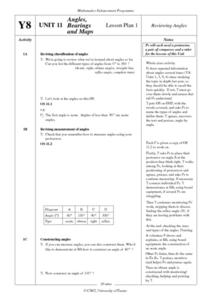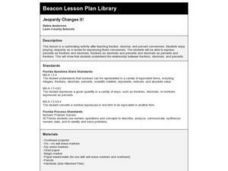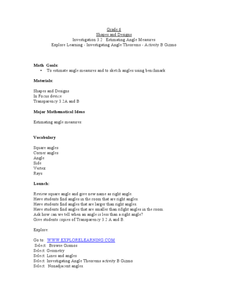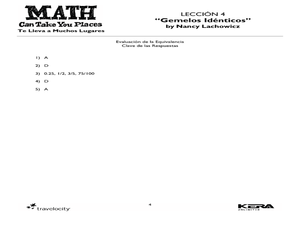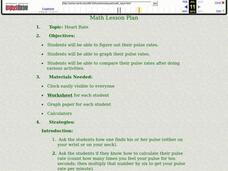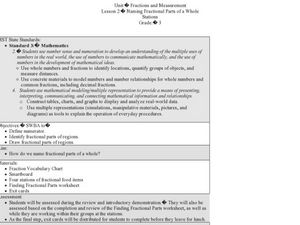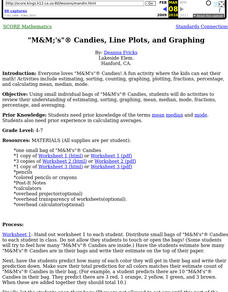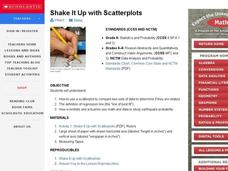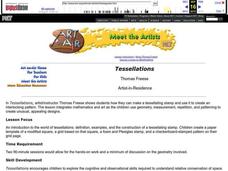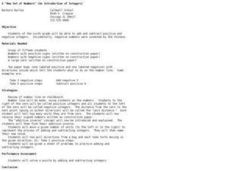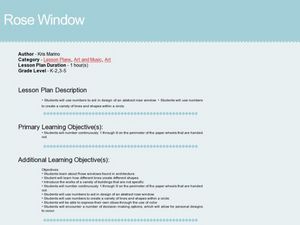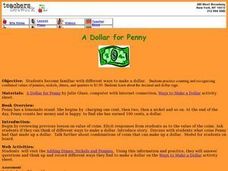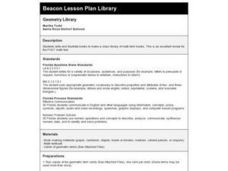Curated OER
How Many Animals?
Students use their math skills to develop estimates for the population of several animal species native to the Austrailian rainforest. It is a simulation that researchers at the Center for Rainforest Studies in Australia perform to...
Curated OER
Angles, Bearings and Maps
Students review what they comprehend about angles. They name the differnt types of angles and define them. Students use their protractors to answer questions, the teacher walks around to look at the positioning of the protractors. ...
Curated OER
When Dinosaurs Ruled the World
Students graph the varying sizes of dinosaurs. For this math and dinosaur lesson, students view dinosaur models and compare the different shapes and sizes of the dinosaurs. Students complete a dinosaur math activity, read The Dinosaur...
Curated OER
Jeopardy Changes It!
Sixth graders enjoy playing Jeopardy as a review for expressing conversions between fractions, decimals and percents. This lesson provides a fun, motivating way for students to demonstrate their learning!
Curated OER
Polygons, Parallelograms, Quadrilaterals- Oh My!!!
Students demonstrate their comprehension of shapes and their properties. They work in small groups. Students review the following terms: property, polygon, quadrilateral, and parallelogram. They read Shape Up! Fun With Triangles and...
Curated OER
Shapes and Designs Investigation
Sixth graders estimate angle measures and angle theroms. In this online interactive geometry activity, 6th graders review types of angles, investigate angle theroms, and explore nonadjacent angles.
Curated OER
Identical Twins
Sixth graders work with equivalent fractions, decimals, and percents. In this equivalency lesson, 6th graders participate in a number of activities aimed at increasing their understanding of equivalent expressions. They form a human...
Curated OER
A Cloak for the Dreamer
Students identify the number of sides and corners of plane figures. In this geometry lesson plan, students read the book A Cloak for the Dreamer and identify the ways shapes fit together. Students review shapes and identify the sides and...
Curated OER
Graphing Heart Rates
Students take their pulse rates. In this graphing lesson, students take their pulse rates and graph them. Students do various physical activities and graph the differences in their pulse rates.
Curated OER
Dividing by 4's
Third graders explore math functions by completing problem solving activities. In this division instructional activity, 3rd graders utilize the division strategies acquired earlier to divide multiple digit numbers by 4's. Students...
Curated OER
Naming Fractional Parts of a Whole
Third graders complete a worksheet. In this fractions lesson, 3rd graders review fraction vocabulary, use the SmartBoard to divide fractions and complete stations where they work with fractional parts of a whole.
Curated OER
M&Ms; Line Plots and Graphing
Students, using small individual bags of M&Ms, engage in activities including; estimating, sorting, graphing, mean, median, mode, fractions, percentage, and averaging.
Curated OER
Shake It Up with Scatterplots
Students identify how to use a scatterplot to compare two sets of data to determine if they are related. Then they identify and describe the definition of regression line (the "line of best fit"). Students also identify how scientists...
Curated OER
Tessellations
Students learn and review basic geometric terms, definitions, and theory, including regular polygons, lines, angles, points, etc. They make a tessellating stamp and create a repeating work of art.
Curated OER
I. M. Pei and the Geometry of the NGA
Students compare design elements in neoclassical and modern architecture. They review knowledge of triangles and quadrilaterals and design a geometric pattern using Pei's polygons They create a city plan using a variety of lines and...
Curated OER
Understanding Fractions
Students explore the parts of an orange to develop an understanding of the addition and subtraction of fractions. The concept of representing parts of a whole by dividing an object into smaller pieces is experienced in this hands-on...
Curated OER
Exploring Area and Perimeter
Two students are blindfolded and each receives a cardboard square, one with pompoms glued around the edge and one with pompoms glued all over the surface. They identify what they feel. The class discusses perimeter and area of polygons....
Curated OER
Money Names and Value
Using graphics, this activity has learners identify the name of each bill and its value. This would be an easy way for students to review this concept. This could be used in conjunction with a review sheet on coins.
Curated OER
A New Set of Numbers
Sixth graders add and subtract positive and negative integers. In this integers math lesson, 6th graders review the number line as a class, with students representing the numbers and moving in a positive or negative direction to find...
Curated OER
Angles, Triangles, Quadrilaterals, Circles and Related
Students classify angles. In this angles lesson, students explore the characteristics of angles, triangles, quadrilaterals and circles. They identify polygons and sing a classifying angles song. Students participate in a manipulative...
Curated OER
Creating Rose Windows
Students view a multimedia presentation to recognize rose windows and quilting patterns. In this rose window perimeter instructional activity, students design rose window from paper. Students review prior knowledge of lines and how they...
Curated OER
Calendar Time
Learners review and answer questions about calendar topics. In this calendar lesson plan, students sing calendar songs, discuss the weather, day, month and year. Learners read a book and ask and answer questions.
Curated OER
A Dollar for Penny
Students demonstrate different ways to make a dollar. In this consumer math lesson, students read the book A Dollar for Penny and identify the value of each coin. Students determine combinations of coins that can make up a dollar.
Curated OER
Geometry Library
Fifth graders write and illustrate books to make a class library of math term books. They utilize vocabulary associated with geometry to make their books. For example, one character may be, Mr. A Cute.



